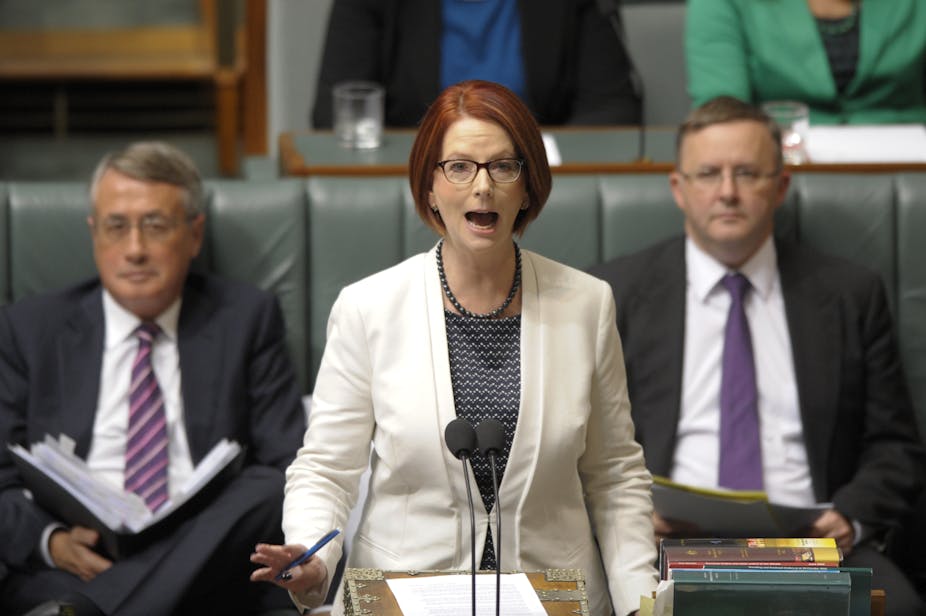The federal government has announced that it will gag debate on 53 bills in the Senate next week.
One of them, the proposed constitutional amendment on the recognition of local government, is to be limited to 30 minutes of debate if it has not been passed by 7:30pm on Monday. It has so far received about three hours of debate in the Senate, so at least that is something.
Another critical financial bill, the Public Governance, Performance and Accountability Bill, which will reform the government’s whole system of financial accountability, will get all of 30 minutes debate. Many other bills will be given just 15 minutes of Senate scrutiny time.
Next week is the last parliamentary sitting period before the election, so a number of bills need to be passed, including the referendum bill. The gagging of debate is therefore more likely a case of mismanagement of parliamentary business, rather than a conspiracy to shutdown debate on the referendum.
Nonetheless, any prudent government that had respect for the constitutional system of government would have introduced this referendum bill weeks ago, and ensured that it had ample time for debate. The fact that the government has now allocated A$10 million to support the “Yes” case and only $500,000 to support the “No” case, also gives the impression that it is not terribly keen on a free and robust political discussion on the issues.
In the recent school chaplains’ case, the High Court held that the Commonwealth government could not simply fund schemes with no more support than an appropriation in the budget. Instead, separate legislation was needed to authorise many kinds of government expenditure. This was because the system of representative and responsible government established by the Constitution requires parliamentary scrutiny of the expenditure of public money.
In particular, the High Court pointed out that the Senate has restricted powers in relation to budget bills, but has full power in relation to legislation that separately authorises the spending of public money. Such legislation is therefore required to support most spending programs in order to ensure full Senate scrutiny of them.
The High Court has also drawn from the Constitution an implication of freedom of political communication. According to the High Court, such a freedom is necessary to permit the Australian people to fulfil their constitutional duties of voting at elections and at referenda. If your vote is to be an informed vote, you need access to free communication about political matters. When a referendum is at issue, voters particularly need access to information, discussion and scrutiny of referendum proposals.
It is therefore all the more disturbing that debate is to be gagged in the Senate on a bill to amend the Constitution. Surely, if there were any type of bill that should be given full and rigorous scrutiny, it is one to amend the Constitution? Surely debate in the Senate also has the potential to form part of the “political communication” which is needed to support electors in forming their voting intentions on a referendum?
Such scrutiny is even more necessary when the referendum bill is intended to permit the Commonwealth to get around the constitutional requirement of legislative scrutiny of Commonwealth expenditure programs. The effect of the school chaplains case was to prevent the Commonwealth from engaging in some of its favourite pre-election pork-barrelling activities, such as funding programs or capital expenditure in “regions” or “communities” that just happen to be in marginal seats.
The High Court now requires such expenditure to be supported by legislation, and that legislation also has to be supported by a constitutional head of power. The Commonwealth no longer has carte blanche to spend on anything it likes.
The proposed referendum allows the Commonwealth to bypass parliamentary scrutiny and the need to operate within its constitutional powers by using grants to local government as a means of fulfilling its desire to gain votes in marginal electorates. Yet what little debate there has been on the referendum bill has not yet addressed this significant constitutional issue in any substantive way. With a gagged debate next week, it is unlikely to do so.
While the High Court has recently defended the important role of parliament in debating and scrutinising bills, including those concerning referenda, the parliament itself seems too often to value its scrutiny role cheaply and to give it up with barely a whimper.

